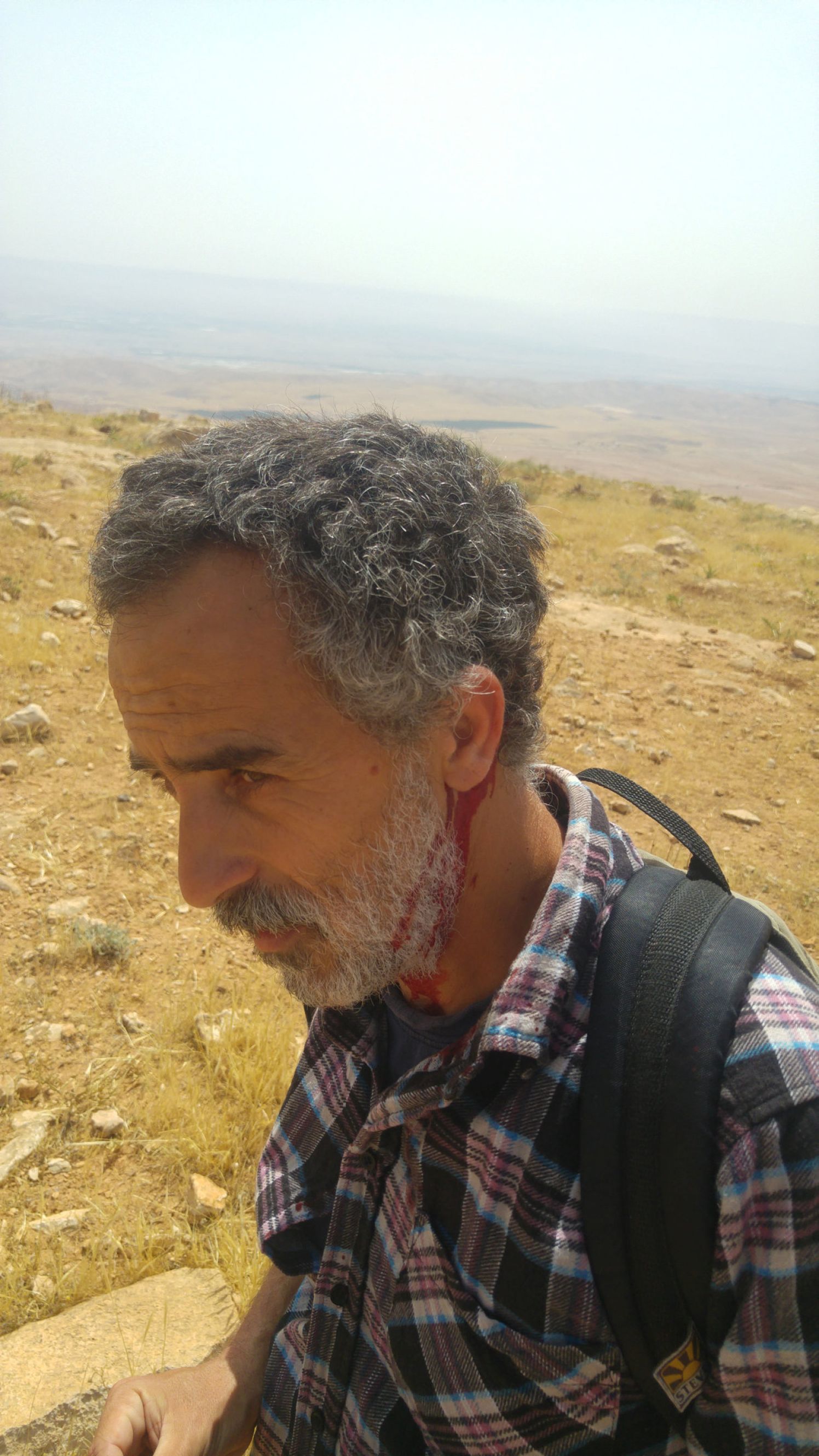The security service didn’t inform Daniel Kronberg of the group Ta’ayush that he wasn’t required to show up, while one critic says it’s ‘forbidden for the Shin Bet to function as a thought police’

The Shin Bet security service violated a High Court of Justice ruling this month by summoning a left-wing activist for questioning without telling him that he wasn’t obliged to come.
The interrogator, who introduced himself as Geva, said he was the agency’s coordinator for the radical left and delegitimization in the Kiryat Arba area.
Daniel Kronberg of Jerusalem, an activist in the group Ta’ayush and executive editor of the Hebrew University’s Israel Journal of Mathematics, told Haaretz that in early July he received a call from a man who said he worked for the Defense Ministry. The man asked Kronberg to meet with him at the Moriah police station in Jerusalem’s Talpiot neighborhood.
Kronberg, like other Ta’ayush activists, spends time every week escorting Palestinian farmers and shepherds in parts of the West Bank where settlers try to prevent them from reaching their lands. He has been attacked by Israelis who came from the settlements several times.
Two of the assaults entailed considerable violence – in February 2014 in the southern West Bank and in April 2017 in the Jordan Valley village of Ouja. The latter assault wounded four activists, including Kronberg. As far as Ta’ayush knows, the assailants were never indicted.
Kronberg met with the Shin Bet agent on July 9. In response to Kronberg’s questions, Geva told him that the summons wasn’t for an interrogation. Only then did he say that Kronberg hadn’t been obliged to come, adding that if he hadn’t come, Geva would have had to decide whether to do “something else” – that is, whether to require him to come.
Geva also said he wasn’t an interrogator, but rather the person responsible for the radical left and dalag. Only later did Kronberg figure out that this was an abbreviation for “delegitimization.”
Before the meeting, which lasted about half an hour, Kronberg’s belongings were searched and he was body-searched. He was told that this was to ensure that he did not have a recording device.
Geva made statements like “I know you” and “I know what you do,” but also asked Kronberg what he did for a living, whether he considered himself a member of Ta’ayush, whether he had heard about Ta’ayush and why he did what he did. Kronberg did not answer these questions and others.
At one point, Geva said, “You escort Palestinians who say their land was taken.” When Kronberg didn’t respond, Geva began speculating about his motives: “You think this is the right thing to do, you think what we’re doing is wrong.”
Geva asked whether Kronberg was ever in a police station. Kronberg answered, “Yes, and you know I was” – to give testimony and file complaints about the assaults. Geva confirmed that he knew, to which Kronberg replied, “So why do you ask?”
He said Geva’s response was something like “out of concern,” and that Geva added several variations on this theme before finally retracting one, giving Kronberg the impression that even Geva felt his feigned concern had been overdone.
Geva told Kronberg, “What you’re doing is okay, but it mustn’t slip into illegitimate acts,” adding, “you’ve had narrow escapes” – that is, “borderline cases.” When Kronberg asked what they were, Geva replied, “violating a closed military zone.”
In 2013, the Association for Civil Rights in Israel petitioned the High Court against the Shin Bet’s summoning of social and political activists for “warning talks” that weren’t investigations.
In February 2017, the court ruled that the agency is authorized to hold such talks, but imposed certain restrictions. These include telling the person in advance that showing up is optional, telling him that he is not suspected of a crime and that nothing he says can be used in court.
The Shin Bet declined to answer Haaretz’s question on why Kronberg wasn’t told he did not have to show up. It also declined to explain why Geva initially introduced himself as a Defense Ministry employee.
This isn’t the first time Shin Bet agents have introduced themselves as responsible for “the radical left and delegitimization.” But during the hearings on the petition by the Association for Civil Rights in Israel, a government attorney insisted the agency doesn’t summon activists only over “delegitimization,” since that isn’t one of the justifications listed in the Shin Bet Law.
The Shin Bet declined to answer Haaretz’s questions on whether its purposes have been altered and whether it is now acting in conjunction with the Strategic Affairs Ministry, which is in charge of leading the campaign against delegitimization and boycotts.
“Mr. Kronberg was summoned for questioning by a Shin Bet security service agent to fulfill the Shin Bet’s purpose, in according with the agency’s powers under the law,” the agency said.
According to the Association for Civil Rights in Israel, summoning activists for warning talks “is an unacceptable practice that shouldn’t exist, and it has no place in a democratic country. We heard with great concern that the Shin Bet agent defined himself as ‘responsible for delegitimization.’ It’s forbidden for the Shin Bet to function as a thought police and undermine freedom of expression.”
